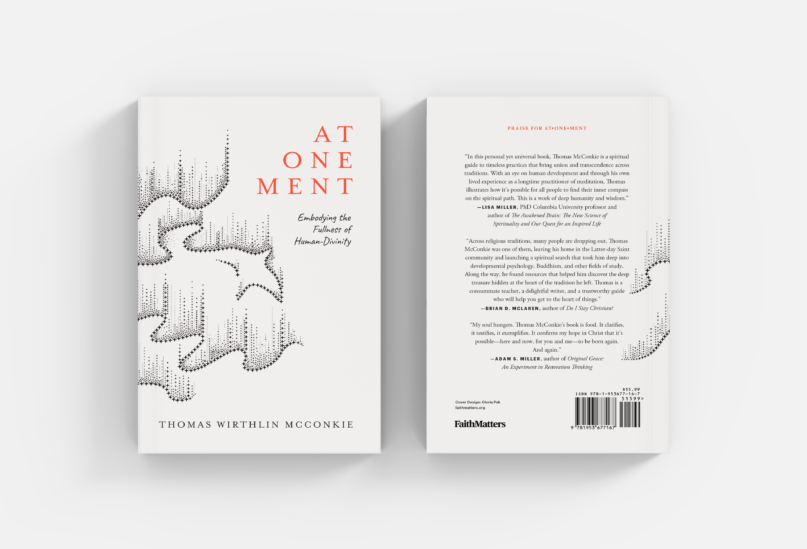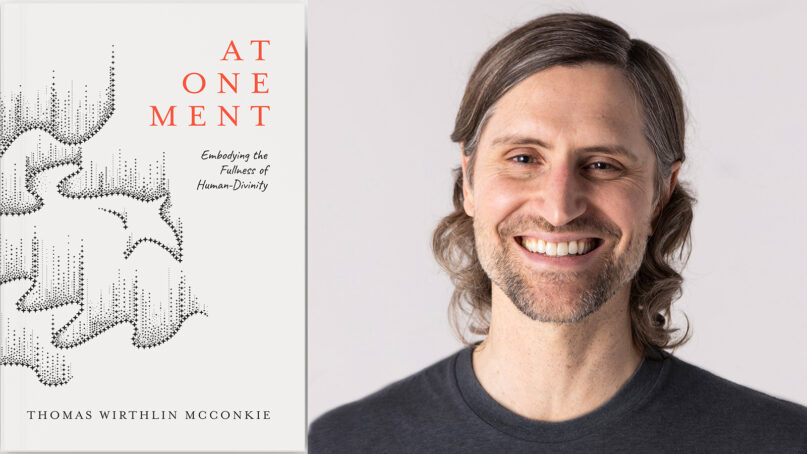(RNS) — Judging from the mail I receive, most of my readers are members of the Church of Jesus Christ of Latter-day Saints, but many feel there’s something missing.
For those who are longing for a deeper experience of faith, I have a book to recommend: “At-One-Ment,” by Thomas McConkie, a meditation teacher who founded the Lower Lights School of Wisdom, which I featured in this column a few years ago.
This interview has been edited for length and clarity. —JKR
The book stresses the idea that ‘the kingdom’ is happening right now. If we’re looking ahead constantly to some future reward for the performance of our faith, we’re going to miss important spiritual growth.
To be precise, I think the kingdom is both. I think it’s now and I think we’re growing into a fullness and becoming more of a Zion people.
My observation in the Mormon community is that we get the latter part fine. But the “now” part of claiming our divinity and our wholeness escapes us in our culture and in some of our doctrine. So the book focuses on that aspect of the doctrine that I think is implicit and sometimes forgotten.
What begins to change when we focus on the reality that the kingdom is now?
A lot. The word that comes to mind is motivation. If we start from a place of lack, everything we do in an effort to improve, no matter how well-intentioned it is, will be imbued with that sense of lack. This makes us prone to burnout, perfectionism and judging other people. Because we feel inadequate ourselves, we’ll naturally see other people as being inadequate.
But if wholeness is what motivates us to act in the world, then everything we do is imbued with that wholeness, giving rise to a sense of generosity and forgiveness. If I have a sense of wholeness, I can forgive myself and everybody else because I can see us all in our individual circumstances struggling to reconnect to that wholeness.

“At-One-Ment” by Thomas McConkie. (Courtesy image)
The book contrasts that wholeness to a kind of ‘performative spirituality’ among Latter-day Saints. What do you mean by that?
It’s human psychology that we want to set up a regimen — to construct meaning in this life that helps us feel safe. So we perform an act like going to church every Sunday, doing our ministering visits, paying our tithing, obeying the Word of Wisdom, et cetera. And my experience is that as a people, we’ve become accustomed to a kind of anxiety that accompanies religious performance. We might still be suffering and feel alienated from God. We might still feel unworthy at a deep level, and yet we don’t stop to question it and ask, “Is there something deeper I’m missing? Or do I just stick with the same regimen?”
My argument in the book is that when we really stop and reflect, we realize that in our religious performance, we’re nurturing the very part of ourselves that the gospel instructs us not to feed. From fixating on always feeling secure to focusing on what others think of us, we’re often concerned with having control over our own circumstances and over other people. If we look closely, that is the psychology of what the Book of Mormon calls “the natural man,” or in Christian mysticism, the false self. In the book I hope to delineate more clearly when we’re in this “operating system” vs. the operating system of wholeness, of “Oneness.”
How can we tell what operating system we’re running in the moment?
If I’m doing something and I can detect that I’m fearful about not having enough, about what others think of me or about controlling things I can’t control, those are the telltale signs. In that operating system, I trust in the strength of the self as opposed to God’s immensity.
The other option is entering a kind of free fall, which is how I define faith. It’s recognizing that I can’t master my circumstances or be in control of the things I’d like to control. But I can open up to a deeper vulnerability in my relationship to myself and therefore with God, and let God start to animate me in a new kind of way.
That definition of faith as free fall is going to be a pretty radical notion for many Latter-day Saints.
It’s very difficult to break the mentality that there is a self that we can perfect. That if we work hard enough and long enough, we will perfect that self eventually. So we keep trying, telling ourselves the story that doing this may be hard now, but it’ll all be worth it later. But later never comes. That’s a deep cultural groove, and not only in Mormonism.
In the book I write about an orthogonal shift, if you will. It’s turning our attention to a completely distinct dimension of our being that cannot be improved. We can’t make that part of ourselves more worthy. It can’t be more lovable, it can’t be more divine. All that is already right here, but it requires a tremendous amount of faith and vulnerability to open up to it.
What would be the first step?
Stillness. When we really interrogate the story that striving is the only way to perfect ourselves, we realize we’ve been defending against a deeper vulnerability by throwing ourselves into action. So in fact, being still and doing nothing will tend to flood us with all sorts of discomfort and vulnerability that we would rather not feel right now.
It’s painful to get to know ourselves in this way. So there’s something counter-instinctual about the move toward stillness. But we don’t have to avoid the truth. I think Jesus was preaching along these lines when he said, “the truth will set you free.” It’s an inward turn, what Christian mystics have designated as the inner path. In the end, it’s not only about what we’re doing in terms of conduct, but a genuine awakening of the heart.
Part of the book is about embodiment, and how the body can help us experience that stillness. Why is that so hard?
As Latter-day Saints, I think we’re caught between two places. On one hand, our theology reveres, honors and elevates the body. But we’ve also inherited a lot of body theology from Christianity that I don’t think we really care for. It’s going to take time to shrug that off. I think there’s room to do some more restoring of the gospel in that area.
I marked a powerful sequence in the book that talks about Joseph Smith and Sidney Rigdon having a vision, and it was a very physical as well as a spiritual experience.
In this instance, Joseph Smith and Sidney Rigdon were receiving a vision of the three degrees of glory. Joseph Smith in the account was glowing — emanating an inner, divine light. Sidney Rigdon, in the meantime, was sitting limp and looking sickly in his chair. Joseph quipped, “Sidney is not used to it as I am.” I use that as an example of how we can develop a capacity to tolerate more intimacy with the divine in these very bodies, that this is a kind of fitness the gospel asks us to develop.
A lot of the book is about how we learn to tolerate more spiritual intensity and not flinch in the face of the divine. God is eager to reveal all their secrets to us if we’re willing to stay open and awake.
Related content:
For some Mormons, “cafeteria spirituality” is a lifeline
What a Mormon doing Buddhist meditation has to do with the future of faith






